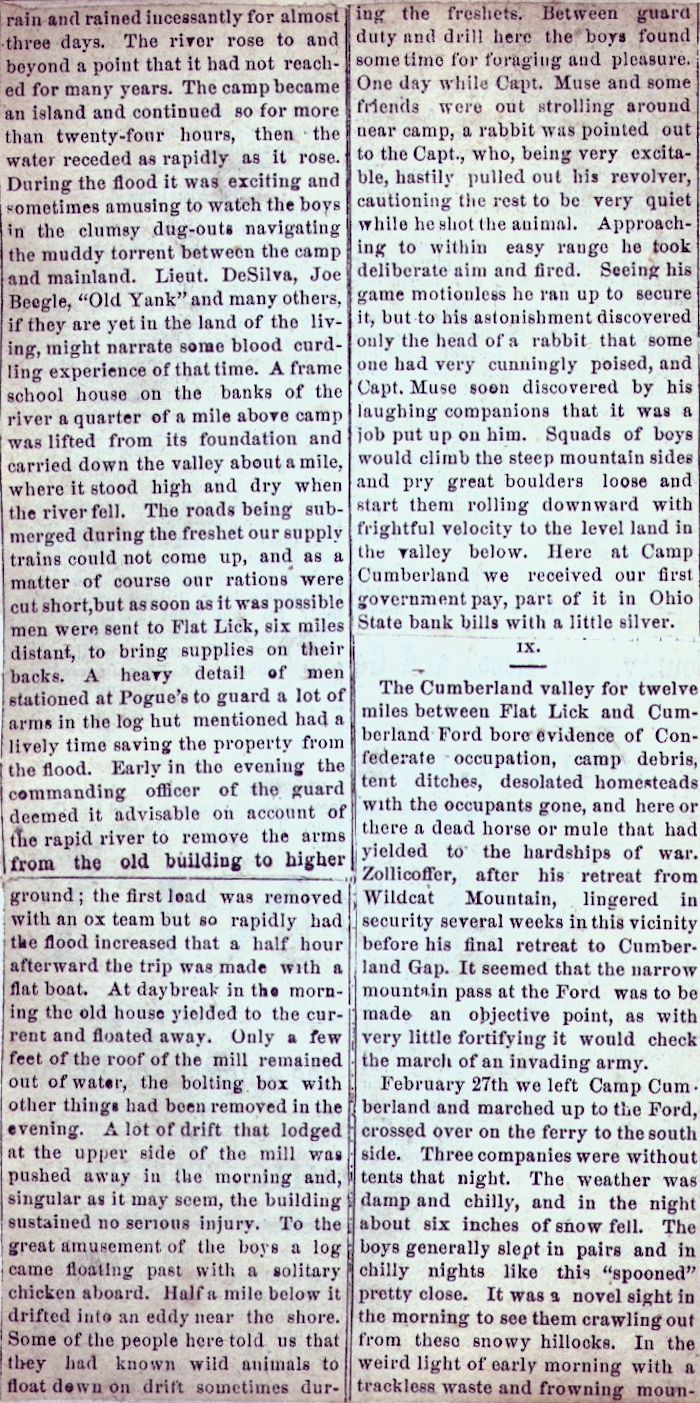| Camp & Field Page 13 | Camp & Field Index Page | 16th OVI Home Page | Camp & Field Page 15 |
The Camp & FieldArticles by Theodore Wolbach |
 Cpl. Theodore D. Wolbach |
The following image is taken from a book titled "Mortality and Statistics of the Census of 1850" in which it is believed retired Captain Rezin H. Vorhes, Company H, pasted over the pages a series of articles written by Cpl. Theodore D. Wolbach, Company E, titled "Camp and Field" and published, by chapter, in the Holmes County (Ohio) Republican newspaper from February 24, 1881 to August 17, 1882. The articles tell the story, in great detail and color, of the 16th OVI, from the inception of the 3-year regiment in October, 1861, through all its camps, battles and marches until it was disbanded on October 31, 1864. The articles pasted in the Vorhes book cover the first 35 chapters, published through October 20, 1881. All the remaining chapters were recently found in a Holmes County library by researcher Rob Garber who obtained copies, performed the transcriptions and provided to this website and which are also presented here, thus providing the complete work by Theodore Wolbach.
Throughout these articles click on the underlined white text for additional details.
The webauthor thanks 16th Ohio descendant Rob Garber for his excellent research on the Camp And Field articles and for performing the tedious digital transcription of those articles found on each page. The transcriptions were made to reflect the original articles verbatim, misspellings and all. Rob is the 3rd great nephew of Capt. William Buchanan, Company F, 16th Ohio, who served in the 90-day regiment as a private, re-enlisting in the three year regiment, and eventually making the rank of Captain of Company F. Thanks Rob!
Page 14 - Chapter 8, 9 - February, 1862
 |
rain and rained incessantly for almost three days. The river rose to and beyond a point that it had not reached for many years. The camp became an island and continued so for more than twenty-four hours, then the water receded as rapidly as it rose. During the flood it was exciting and sometimes amusing to watch the boys in the clumsy dug-outs navigating the muddy torrent between the camp and mainland. Lieut. DeSilva, Joe Beegle, |
ing the freshets. Between guard duty and drill here the boys found some time for foraging and pleasure. One day while Capt. Muse and some friends were out strolling around near camp, a rabbit was pointed out to the Capt., who, being very excitable, hastily pulled out his revolver, cautioning the rest to be very quiet while he shot the animal. Approaching to within easy range he took deliberate aim and fired. Seeing his game motionless he ran up to secure it, but to his astonishment discovered only the head of a rabbit that some one had cunningly poised, and Capt. Muse soon discovered that it was a job put up on him. Squads of boys would climb the steep mountain sides and pry great boulders loose and start them rolling downward with frightful velocity to the level land in the valley below. Here at Camp Cumberland we received our first government pay, part of it in Ohio State bank bills with a little silver. Published in Holmes County Republican IX. The Cumberland valley for twelve miles between Flat Lick and Cumberland Ford bore evidence of Confederate occupation, camp debris, tent ditches, desolated homesteads with the occupants gone, and hear or there a dead horse or mule that had yielded to the hardships of war. Zollicoffer, after his retreat from Wildcat Mountain, lingered in security several weeks in this vicinity before his final retreat to Cumberland Gap. It seemed that the narrow mountain pass at the Ford was to be made an objective point, as with very little fortifying it would check the march of an invading army. February 27th we left Camp Cumberland and marched up to the Ford, crossed over on the ferry to the south side. Three companies were without tents that night. The weather was damp and chilly, and in the night about six inches of snow fell. The boys generally slept in pairs and in chilly nights like this |
| Camp & Field Page 13 | Camp & Field Index Page | 16th OVI Home Page | Camp & Field Page 15 |